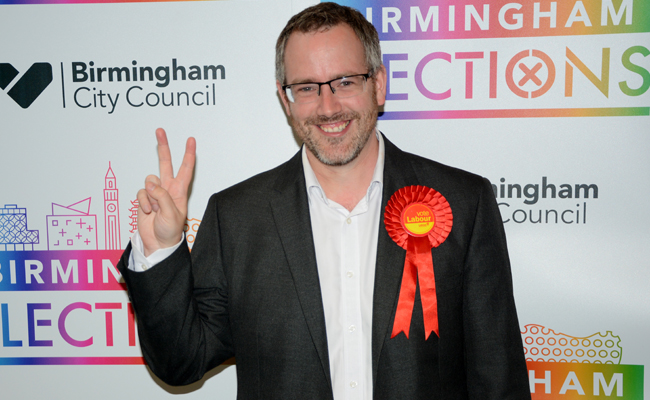Simplistic analysis of community cohesion in Birmingham fails to recognise the complexity of a super-diverse city according to the Cabinet Member with responsibility for the topic.
Cllr Tristan Chatfield, Cabinet Member for Social Inclusion, Community Safety and Equalities, has spoken out as consultation into a new Community Cohesion strategy for the city gets underway from today (July 9).
The ‘Green Paper’ draft strategy, supported and not led by the council as well as being backed by a range of partner organisations, looks to rectify the imbalance in perceptions and highlight examples of good practice across the city.
Cllr Chatfield said: “Birmingham has been used as a punchbag on issues around cohesion for as long as I have been involved in local government.
“The Trojan Horse scandal, OFSTED, the Henry Jackson Society study (into the origin of terrorism offenders) and the Dame Louise Casey report have all been used to illustrate and highlight wider concerns regarding integration in the UK.
“Birmingham has been presented as a battleground between two competing ideals, liberal democracy versus religious theocracy. This analysis is grossly simplistic and fails to recognise the complexity of Birmingham. It also neglects the many examples of good work being carried out around cohesion every day in our city.”
Cllr Chatfield said that the overall approach was to recognise that whilst diversity is broadly positive and has brought many benefits to the city it also presents challenges – often simply a result of the rapid population churn that has resulted from internal as well as international migration.
Cllr Chatfield added: “Poverty and economic exclusion remain as a great barrier to developing the kind of inclusive city we all want to see. We cannot rely on national government policy to address these problems alone, it is essential therefore the Birmingham sets out a clear set of principles when it comes to cohesion.”
The eight guiding principles in the Green Paper, identified during conversations last year with partners, communities and young people are:
- Mainstream cohesion: making community cohesion everyday business;
- Connecting and exchanging ideas that promote community cohesion and mobilise social action
- Nurturing and supporting aspiration of young people
- Promote citizens’ rights and responsibilities
- Progress equality in all spheres of social and economic life
- Promote inclusive economic growth that benefits everyone across Birmingham
- Empowered and engaged neighbourhoods
- Bringing together people through art, culture and sports
On the final principle above, the Green Paper makes specific reference to Birmingham’s status as Host City of the 2022 Commonwealth Games – which the draft strategy says should be used as a catalyst for further improvement when it comes to creating a cohesive society.
David Grevemberg CBE, Chief Executive Officer of the Commonwealth Games Federation, which awarded the 2022 Games to Birmingham last year, said he supported the Green Paper’s suggestions about the potential unifying effect of sport upon the local community.
“In Glasgow 2014 and at Gold Coast 2018, we saw first-hand how civic pride increased as a result of hosting the Games, creating opportunities to bring together host communities in a celebration of global sport and local culture,” he said.
“In the case of Glasgow, long-term post-event research has shown that people feel more engaged in decision-making and that the Games has raised the city’s profile. This continued investment and successful bidding of more major events has undoubtedly had a huge positive impact.
“We’re all excited by the prospect of how Birmingham, a young, diverse and truly Commonwealth city, will showcase its humanity and pride to the world. Everyone in Birmingham has a part to play in the success of their largest ever sporting and cultural event in 2022.”
Consultation on the Green Paper runs from July 9 to August 31, and a White Paper is set to be published in October ahead of a Community Cohesion summit for the city a month later.
Marcia Lewinson, Chief Executive of Birmingham-based W.A.I.T.S. (Women Acting In Today’s Society – which supports women to overcome issues such as domestic abuse and poverty), is also urging as many people as possible to have their say on how to develop cohesion in the city.
She said: “For me community cohesion is about bringing people together to achieve goals that benefit individuals, families and communities.
“At W.A.I.T.S. we see everyday women and families who feel isolated and disengaged due to inequality, poverty, language barriers and abuse. The Community Cohesion Strategy Green Paper suggests how women, young people and families can be empowered by removing barriers and developing skills so that they are able to contribute to Birmingham’s economy, become self-sufficient and participate in the democratic process.
“By us all working together in this way we will break down barriers and end exclusion. “
The Rt Rev David Urquhart, the Bishop of Birmingham, who has also been involved in developing the strategy, added: “Birmingham has a wonderful history of welcome and hospitality. As Bishop of Birmingham I believe that our city of over a million people can be an example for the world in living together in diversity and difference.
“With youthful creativity and opportunities for every age and background we have the talents and resources for global success.
“The Community Cohesion Green Paper provides an opportunity for as many people as possible in Birmingham to be involved in shaping a new way forward for a dynamic international 21st Century city.”
To have a say on the Green Paper, visit: https://www.birminghambeheard.org.uk/economy/community-cohesion-strategy/
To join the debate online, use the hashtag #bhamcohesion
